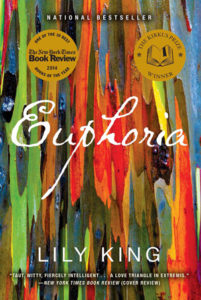 You don’t expect much drama from anthropologists in the jungle, but the members of this trio divide their angst between their simmering and barely acknowledged love triangle and their understanding of pre-industrial river people of New Guinea in the 1930’s.
You don’t expect much drama from anthropologists in the jungle, but the members of this trio divide their angst between their simmering and barely acknowledged love triangle and their understanding of pre-industrial river people of New Guinea in the 1930’s.
The story balances those two themes well, with plenty of interesting and well-researched anthropological observations, and lots of tense sideways glances among the mosquito-bitten scientists. In the last quarter of the book a mildly dramatic event erupts and is quickly drawn to a close, a hasty attempt, I believe, to add some story tension before the pages ran out.
Instead of a strong plot, the excellent writing keeps the pages turning. Descriptions of the environment, the native people, and the scientists’ activities are extremely deft: evocative yet economical, like poetry. Alternating first-person narrators include intense yet subtle Virginia Woolfian introspection. For example, Nell, the female of the triangle, writes in her diary about the two men:
“B is intuitive about F’s possessive nature so that I haven’t had to say a word, like last night when we were talking about sex roles in the West and G and I fell perfectly in step and I could sense how much further we could take our thoughts but B rerouted it back to Fen’s Dobu at just the right moment.” (p. 142).
In fact the story opens with B’s account of having tried unsuccessfully to commit suicide by walking into a river with his jacket pockets filled with stones (as Woolf actually did).
The tale is loosely based on Margaret Mead’s life and work with Reo Fortune and Gregory Bateson, but unlike many historical novels, it wears its research lightly and never loses sight of the fact that it is a novel, not a biography. It also gives a good portrait of cultural anthropology at a certain moment, before full development of thought about structuralism, colonialism, otherness, and related ideas.
Sense of place and character is palpable in this book. Absence of a compelling plot must be tolerated in literary work. Nevertheless, you close the covers with a clinging impression that you have your own memories of having been there.
King, Lily (204). Euphoria. New York: Grove/Publishers Group West (257 pp).
